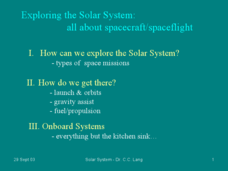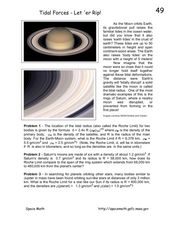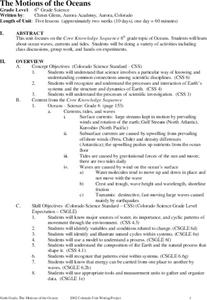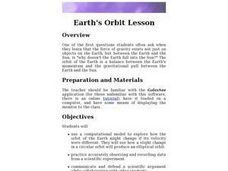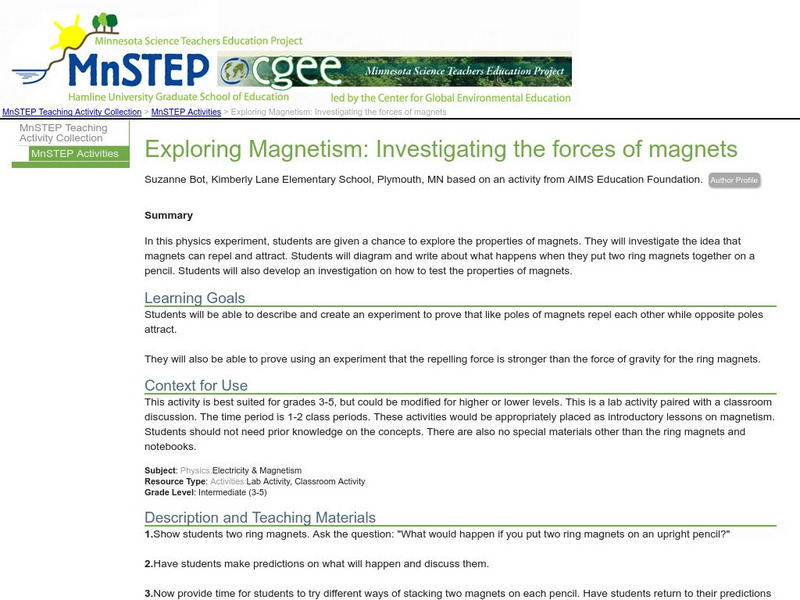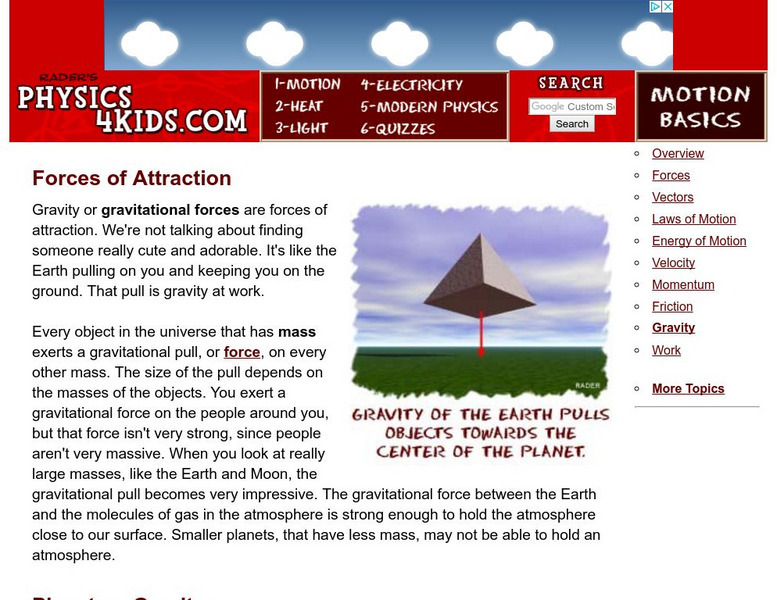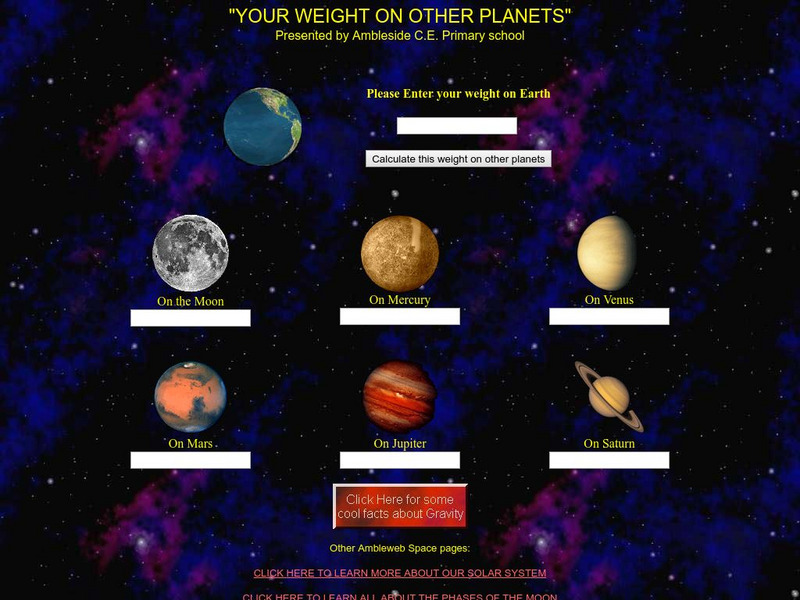Curated OER
Properties of Matter
This PowerPoint is a gem! Seventy-eight slides present an entire introduction to matter in bullet-point fashion. Viewers learn about everything from mass and inertia to phase changes and gas laws! The only glitch is that the links to...
Curated OER
Exploring the Solar System: All About Spacecraft/Spaceflight
Rarely do you find resources that reach high school astronomy learners. Here is something at their level! The physics of flyby missions is explained via several examples. Landing, penetrating, and roving spacecraft are examined. Diagrams...
Curated OER
Astronomy - Sun, Moon, Tides
Colorful in appearance, but without any photos or graphics, this PowerPoint is best used as a note-taking guide for your lecture. Viewers in your earth science class will discover characteristics and phases of the moon, its role in...
Curated OER
Tidal Forces-Let'er Rip!
In this tidal forces worksheet, students read about the gravitational pull from the moon that causes the ocean tides. Students solve 3 problems including finding the Roche or the tidal radius for the Earth and Moon, comparing the Roche...
Curated OER
Physics: Bounce - Projectile Motion and Collisions
Students conduct and observe experiments in Newtonian mechanics, kinematics, and projectile motion. They analyze the motion of a ball rolling off a table, falling, and then bouncing. Students answer a series of questions analyzing the...
Curated OER
The Motions of the Oceans
Students examine the topics of ocean waves, currents, and tides. They locate and label ocean currents on a world map, conduct experiments, analyze key vocabulary, view demonstrations and record the data, and complete handouts.
Curated OER
Earth, Moon, and Sun
In this earth, moon, and sun orbits worksheets, students will read the cause of four different events that focus on the earth's rotation around the sun and the moon's rotation around the earth. Then students will write in the effect of...
Curated OER
Alternative Energy Resources
In this alternative energy resources worksheet, students read and describe the advantages to using tidal power. Then they identify and list some of the disadvantages to using tidal power as mentioned in the brief excerpt read. Students...
Curated OER
Black Hole Lesson
Tenth graders experiment with detection techniques for black holes by modeling the rotation of galaxies with larger and larger masses in the center. They discover while some events cannot be directly observed they may be observable in...
Curated OER
Topsy Turvey Tides
Young scholars explore ocean tides. They research how the sun, moon and earth affect the tides. Students draw a diagram illustrating low tides and high tides. They discuss the affect of gravitational pull on the oceans.
Curated OER
Earth's Orbit Lesson
Tenth graders devise a computational model to explore how the orbit of the Earth might change if its velocity were different. Using accurately recorded data, 10th graders defend a scientific argument.
Vision Learning
Visionlearning: An Experiment: Acceleration During Free Fall
Animated simulation re-enacts Galileo's experiment of dropping objects off the Leaning Tower of Pisa.
NOAA
Noaa: National Ocean Service: Education: Currents
Illustrated tutorial explains the numerous factors which shape ocean currents. Animations help students visualize how these aspects constantly affect the water movement in the ocean and how scientists use this information to study ocean...
Science Struck
Science Struck: What Is Gravity and How Does It Work
A very detailed look at gravitational force and the many theories that have been put forward to try to explain it. Includes lots of illustrations.
Science Education Resource Center at Carleton College
Serc: Exploring Magnetism: Investigating the Forces of Magnets
Students describe and create an experiment to prove that like poles of magnets repel each other while opposite poles attract. Using the experiment, they use the data to support the claim that the repelling force is stronger than the...
Wikimedia
Wikipedia: The Black Hole
This site examines the black hole as an object in astrophysics. Delve into this comprehensive resource that covers this concept from its history, to qualitative physics, the reality of black holes, mathematical physics and more.
Concord Consortium
The Concord Consortium: Molecular Workbench: Freefall 3 D
Change variables to see how an object reacts to freefall in a 3D environment.
Physics4kids
Physics4 kids.com: Forces of Attraction
Several diagrams provide explanations of planetary gravity as well as the gravity that exists between all objects.
NASA
Nasa Star Child: Space Probes to Mercury
Simple information about the first space explorer to visit Mercury. Good picture of the Mariner 10 probe. Links to a glossary of terms.
Physics Classroom
The Physics Classroom: Newton's First Law of Motion
A clear explanation of Newton's First Law of Motion, the law of inertia, with diagrams and real-world examples. Useful for both students and teachers. Written by a high school physics teacher.
Physics Classroom
The Physics Classroom: Newton's Laws: Elevator Ride Interactive
Have you ever felt that queasy feeling in a moving elevator? Explore the physics behind the sensations of weightlessness and weightiness. Teacher notes and a downloadable handout are also provided.
Ambleside Church of England Primary School
Ambleside c.e. Primary School: Your Weight on Other Planets
Students enter their weight here on Earth, and find out how much they would weigh on the moon and other planets.
CK-12 Foundation
Ck 12: Kindergarten Science
[Free Registration/Login may be required to access all resource tools.] A science text for kindergarten that covers the weather and gravity.
CK-12 Foundation
Ck 12: Fifth Grade Science: Earth Science: Gravity
Do you know how gravity affects you? This module defines gravity and explains how gravity affects the motion of objects.



